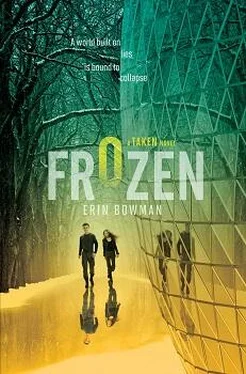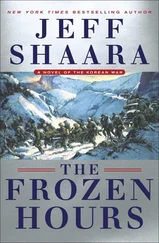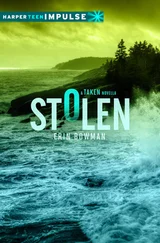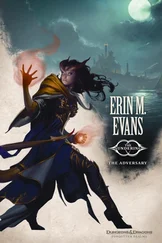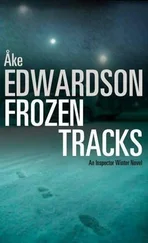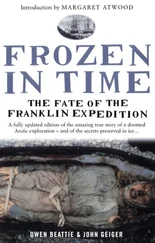“I thought we were talking about the years between the Quake and the War,” Bree interjects.
“I’m getting there, Nox.” Sammy takes a swig from his waterskin before continuing. “My great-grandfather had enough money to move to Taem with his fiancée. It was expensive to buy your way under a dome, but he got lucky, especially with the timing. Two months after his move, the Continental Quake hit: a half dozen widespread earthquakes in the course of three days. The coasts pretty much all fell into the ocean. The gulf ate its way up the center of the country. Rivers and streams flooded with salt water. Roads were upturned and cities toppled—including some domed ones. If the ground falls out from beneath a place, it’s not going to stay standing no matter how indestructible its outer shell is.
“People obviously panicked. My great-grandfather said the world outside still-standing domes became like a war zone. Everyone was looting abandoned stores, stealing from neighbors. Law enforcement was stretched too thin. Hospitals were over capacity. And then when the flooding didn’t slow, the government started barricading and controlling freshwater resources. Clean water went to the capital first, then the surrounding areas.”
“And it was taxed like crazy,” Bo chimes in. “I heard people muttering about that during my time in Taem. The farther water had to be shipped, the more expensive it was.”
“Not exactly how disaster relief should work,” Sammy says. “The West got furious—threatened everything imaginable, including secession. The capital ignored it all, and that, according to my great-grandfather, was when they attacked.”
“The virus?” Bree prompts. I know the one she’s referencing—the virus AmWest used to initiate war on AmEast—the very same virus that Frank’s lab workers transformed into the threat we faced in the fall.
“A Western movement dropped it in Big Water,” September says. “They were trying to take control of some water sources in that territory, but the damn thing mutated, spread, took on new forms. Even killed a bunch of the West’s own soldiers. Domed cities went on lockdown, but outside, people were dropping like flies.”
“And so began the Second Civil War,” Bo says rather casually, which makes me wonder how many times he heard these stories in Taem to become so numb. “The East staged a counterattack. Millions of lives were lost—to bombs, to disease. Point is, the country tore itself apart from the inside until two separate nations emerged: AmWest, their secession complete, and AmEast, led by Frank’s father, Dominic Frank.”
“And your great-grandfather was in Taem during all that fighting?” I ask Sammy.
“Yup, and the way he told it, Dominic was a decent ruler. It was only when Frank took over that things fell apart. Frank didn’t trust the people, so he stripped away everything he saw as a risk to a unified AmEast. Books, music, art—anything that could encourage debate or confrontation was declared illegal.”
“That doesn’t even make sense,” Bree says. “Debate’s a good thing. And why didn’t Frank focus on AmWest? They were clearly the enemy, not his own people.”
“Look, Nox,” Sammy says. “I get it. Really, I do. It’s messed up.”
“There has to be a reason. A motive. Something .”
September leans forward, firelight dancing on her face. “A few years after the War, when Frank was at college in Taem, his father—his mother and younger brother, too—were murdered. They were distributing water to communities in AmEast’s Western Territory—not far from where Group A now stands. AmWest soldiers stormed the square, shot Frank’s family and every Order member in sight. Then they took off with the water. The people of AmEast did nothing to stop it, and if there was a moment that caused Frank to snap, I’d imagine that was it.”
“That’s not the way my great-grandfather told it,” Sammy says. “His cousin was there that day; he said AmWest was only looking to take out the Order, but Frank’s family was killed in the crossfire. When the bullets stopped flying, AmWest apparently gave a speech about how the Franconian Order wasn’t the solution to rebuilding the country. It was a brand-new division back then,” he says quickly, reading the confusion on my face, “aimed at instilling peace between the two countries.”
“Regardless of its goals, AmWest never liked the Order,” Bo says. “They always felt that the people should rebuild the country together, not have it forced upon them at gunpoint by law officials wearing black. Sort of admirable, I think.”
September scoffs. “Well, they’re not teaching Sammy’s great-grandfather’s version of the event in school.”
“Of course not!” Sammy says. “Frank wants us to all believe the version where AmWest mercilessly assassinates his family. It paints him as an advocate for justice.”
“Are you saying you think AmWest isn’t despicable?” September counters. “After the virus that started the War? The fight they continue today? I mean, they just attacked Taem over the summer!”
Sammy rubs the back of his neck, but doesn’t answer.
“I think the point here is that Frank stepped into his father’s shoes with motives more deeply rooted in revenge than justice,” Bo says.
“But it’s the people of AmEast suffering most under Frank’s rule,” Emma points out. “People not even responsible for his parents’ death.”
“I know that. You know that,” Bo says. “But if it had been you in Frank’s place, do you think that day might have broken you?”
Months ago, when I was first in Taem, I saw an image of a family on Frank’s office wall. I understand now that Frank was the older of the two boys. His mother was smiling, her arms on his brother’s shoulders, his father looking stern. Frank’s family hangs there, always reminding him, always motivating him. I wonder if Frank’s ever noticed that his goal of avenging them has slipped into a territory that can no longer be considered admirable.
“So then he started the Laicos Project,” I say. “He began growing his soldiers, boys he could later replicate to fight against AmWest, to serve in the Order.”
“And girls,” Bree points out. “Boys and girls.”
Sammy nods. “Yup. You lot are just another piece in the puzzle of a man spiraling out of control. But of course, no one has stopped him. He is still bent on demolishing AmWest, and he fights that battle daily. And although he’s restricted the lives of people in AmEast, he’s also managed to keep up the work of his father, getting water to almost everyone in need. Rationed and highly taxed water, but still. Plus the Order is loyal to him, as are the majority of citizens in his cities. They know life’s far worse outside the domes.”
“Yeah, like in Stonewall,” I say. “Where he takes their water and gets them all sick in the process.”
“I never said it was right,” Sammy says.
“None of us have,” Bo adds. “But I can understand his motives in some weird, twisted way.”
I hate to admit it, but I can, too. I look over at Blaine, who is smiling as Aiden beats Jackson in yet another round of their game. I’ve already lost my mother to illness. I remember what it felt like to lose Blaine to the Heist. If they’d been taken from me all at once—murdered—I know I’d spend the rest of my life trying to avenge their deaths.
Aiden turns to play a round of his hand game with Blaine. The boy reveals scissors; my brother, a rock. Blaine reaches out to clunk Aiden with his fist, but he moves too quickly, or too forcefully, because Rusty lunges. Blaine is thrown backward into the snow. It’s not until he starts screaming, wrestling against the dog locked on to his forearm, that I’m jolted into action.
Читать дальше
